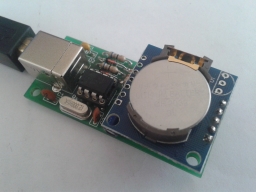-
Notifications
You must be signed in to change notification settings - Fork 83
UsbRtc
A few users have asked for a real time clock to be used with the Atari ST core. While the board itself does not provide something like that it's luckily pretty exandable with USB peripherals.
Unfortunately something like a USB RTC doesn't seem to exist, so i had to build my own. This is a rather easy task given the fact that many years ago i built a usb to i2c converter named I2C-Tiny-USB. This device can easily be combined with one of those cheap DS1307 based i2c RTCs available from EBay. The resulting device looks like this:

The latest firmware supports this device out of the box. Just plug it in and it will be used. No configuration required. The supported cores so far are the Atari ST (both the original and MiSTery), Minimig-AGA, Archimedes, MSX, Plus Too, ZXN, BBC Micro (in Master mode).
The device runs out of the box under Linux. The i2c-tiny-usb is detected by nearly all Linux distros out of the box. Also the ds1307 is supported. The only link missing is to tell Linux to probe for the RTC as the i2c doesn't have a auto detection mechanism.
Once the i2c-tiny-usb has been plugged in enter "dmesg" to check for the proper detection of the i2c bus. Dmesg should show something like this:
[10011.794901] usb 2-1.4: USB disconnect, device number 9
[10241.628102] usb 2-1.4: new low-speed USB device number 10 using ehci-pci
[10241.746228] usb 2-1.4: New USB device found, idVendor=0403, idProduct=c631
[10241.746233] usb 2-1.4: New USB device strings: Mfr=1, Product=2, SerialNumber=0
[10241.746237] usb 2-1.4: Product: i2c-tiny-usb
[10241.746240] usb 2-1.4: Manufacturer: Till Harbaum
[10241.746770] i2c-tiny-usb 2-1.4:1.0: version 1.05 found at bus 002 address 010
[10241.747272] i2c i2c-5: connected i2c-tiny-usb device
Now that we know the i2c bus has the id i2c-5 we can request the driver for the ds1307 to be loaded using the following command (replace the bus id with the one you just found out) as root:
echo ds1307 0x68 > /sys/bus/i2c/devices/i2c-5/new_device
Once more check "dmesg" for additional information and you should find something like this:
[10241.813427] rtc-ds1307 5-0068: rtc core: registered ds1307 as rtc1
[10241.813434] rtc-ds1307 5-0068: 56 bytes nvram
[10241.813492] i2c i2c-5: new_device: Instantiated device ds1307 at 0x68
Your RTC is detected. In this case as rtc1 since the system already had a built-in rtc used under rtc0.
You can now read the time stored in the rtc using:
$ sudo hwclock -f /dev/rtc1 -r
Tue 20 May 2014 12:19:17 PM CEST
Or you can set the current system time to the RTC using the following command:
hwclock -f /dev/rtc1 -w
MiST FPGA - One Chip to Rule Them All
- What is it?
- FAQ
- Board overview
- Installing firmware
- Joystick mapping
- Peripherals
- Projects it is based on
- Rom Management
- Setting up a mist.ini file
- Using a custom font
- Tested Displays/Upscalers
- Troubleshooting
- Videos
- User Videos
- Getting Started
- Current core status
- Joy/Keyboard/On-board Shortcuts
- MIDI support
- SD card setup
- Startup menu
- Atari ST
- Atari ST/STe (mistery)
- Amiga
- Amstrad
- Amstrad - alternative
- Apogee/Radio86RK
- Apple I
- Apple II+
- Apple //e
- Apple Macintosh
- Acorn Archimedes
- Atari 800
- BBC Micro
- BK0011M
- Commodore PET
- Commodore VIC-20
- Commodore 64
- Commodore 16/Plus4
- Enterprise
- HT1080Z (TRS80 I clone)
- LM80C
- Mattel Aquarius
- Miles Gordon SAM Coupe
- MSX
- Ondra SPO 186
- Oric
- PC (Next186)
- PC (XT)
- Primo
- Sinclair ZX80/ZX81
- Sinclair ZX Spectrum
- Sinclair ZX Spectrum - alternative
- Sinclair ZX Spectrum Next
- Sinclair QL
- Texas Instruments TI-99/4A
- TSConf
- Vector-06C
- Videoton TVC
- Vtech Video Technology Laser 350/500/700
- Atari 2600
- Atari 5200
- Atari 7800
- Bally Astrocade
- Coleco ColecoVision
- GCE Vectrex
- Intellivision
- Nec PC Engine/TurboGrafx-16
- Nintendo Gameboy
- Nintendo NES
- Nintendo SNES
- Philips Videopac/Odyssey²
- Philips Videopac/Odyssey² - alternative
- Sega Genesis/Megadrive
- Sega Master System
- SNK Neo Geo MVS/AES